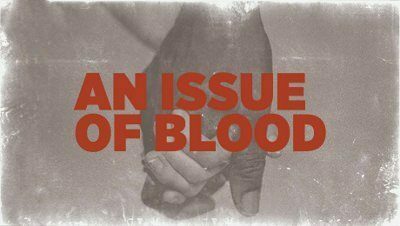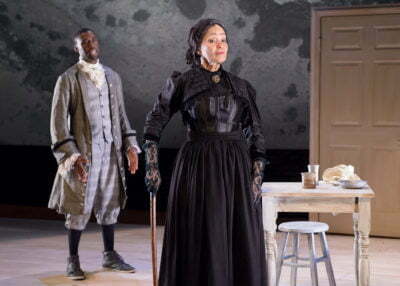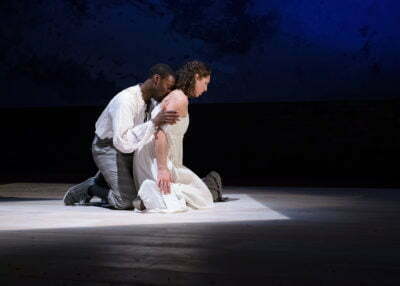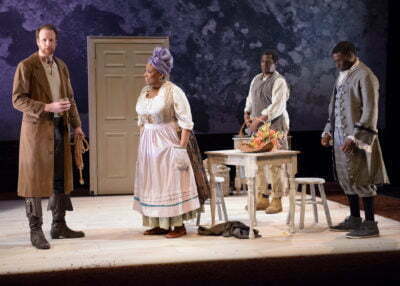An Issue of Blood: An Historical Parable
Directed by Chay Yew
Produced by Victory Gardens Theater, Chicago
New Play Packed With Plot
Victory Gardens playwright Marcus Gardley put his new drama A Wonder in My Soul on hold to write this play, An Issue of Blood, in the wake of nationwide protests against police misconduct. With a conscientious attitude toward history, Gardley decided to address racial tension and inequality today by going back to the origin of racism in the seventeenth century colonies. An Issue of Blood is set in 1676, the year of Bacon’s rebellion, but though Gardley and the rest of the creative team refer to Bacon in the program material, he is not mentioned by name in the play. Instead, we get an idealized portrait of his subordinates and indentured servant supporters, who crossed the nascent black-white divide to fight against the planter class (instead of Native Americans, in this version). To depict the complexity and importance of these events is a tall order in itself, and Gardley adds a love triangle and a ghost story on top of it. The result is a play with potential to dispel the pernicious myth that racism is natural if the viewer is fully attentive to all the provided materials, but also contains a lot of distractions.
Gardley’s setting is a tobacco plantation owned by Negro Mary (Lizan Mitchell), the first black female slave brought to Jamestown. There she rules with an iron fist, but not without opposition. Her trusted indentured servant, Dozens Goode (Cleavant Derricks) is a leader in the planned uprising, and her house is first on his list of targets. Dozens’s wife Nova (E. Faye Butler) is doubtful of his plan. She’s a seer, and knows the plan will fail, and a bill under consideration in the House of Burgesses that will make slavery a permanent condition, strip slaves of all rights, and create inequality between Africans and Irish will pass. Nova’s only goal is to preserve the lives of her husband and Mary’s son, John Israel (Tosin Morohunfola), whom she has raised like her own.
John Israel has recently returned to Virginia after being sent to England by his mother. Mary has some divination powers of her own, and realized the land of her plantation, which had absorbed the blood of the slaves she worked to death and her husband, also desires the blood of her son. That is why she sent him away, and she prays constantly that the Anglicans’ god will protect him. But John Israel intends to take over the plantation for himself, and has fallen in love with an Irish indentured servant, Calla (Eleni Pappageorge). She knows he can grant her freedom, although part of her still loves the constable, Mason Esau (Steve O’Connell), who turned her down for someone of a higher status. Esau still carries a torch for Calla too, and tasked with carrying out the new racist laws, a show-down with John Israel is inevitable.
Besides some opening night nervousness, the actors all give strong performances. I was especially impressed with Mitchell, who has a long monologue in which she tells the story of Negro Mary’s life. It’s fascinating, and Mitchell projects the strength and ambition of her juicy, high-maintenance, domineering character. E. Faye Butler is a worthy foil as Nova, who is more intimate and open with her affection, but less willing to honor her loved ones’ desires. John Israel is an immature person, but Morohunfola gives that immaturity an innocent spin, and we can sympathize with his exasperation toward his mother and nurse. O’Connell’s Constable Esau is wisely understated, and more a social climber than a mindless thug. Myung Hee Cho’s abstract set design emphasizes that this story is a parable, not an historical drama, through use of a wooden rectangular floor surrounded by red dirt. Removing the material wealth at the heart of the slavery conflict from the onstage image forces us to focus on the damage to human beings. Likewise, Izumi Inaba’s costume design draws inspiration from the period, especially in John Israel and Negro Mary’s clothes, but subverts them with modern shoes, giving the play a foot in the real world.
Under Chay Yew’s direction, each of the plot threads are interesting on their own and clearly develop within this semi-fantastical realm. Even though there are only six actors, we get some feeling of the world beyond. Again, that key word “parable” in the play’s subtitle justifies the supernatural elements in a social critique, although playing a recording of the cursed land hissing “work me” like Audrey II went a little far for me. I like the idea of the personal and political forces blending into each other to drive the tragedy, but I think the balance is too heavy on the personal side. The play ends with audio recordings of the shootings that prompted its creation, just in case you didn’t get it. It’s unnecessary, and more exploration of why specifically that form of racism was willfully constructed at that time would have relieved the anxiety the creative team apparently felt over being misunderstood. But I still think it’s an interesting show, and partly serves its purpose in improving the discourse on race just by drawing attention to a crucial, but largely forgotten period.
Recommended
Jacob Davis
Reviewed April 10, 2015
This play has been Jeff recommended.
For more information, see An Issue of Blood’s page on Theatre in Chicago.
Playing at Victory Gardens Theater, 2433 N Lincoln Ave. Tickets are $15-60; to order call 773-871-3000 or visit www.victorygardens.org. Plays Tuesdays at 7:30 pm (except April 14 and 21, when shows are at 10:30 am), Wednesdays at 7:30 pm (except April 22, when the show is at 2:00 pm), Thursdays at 7:30 pm (except April 30), Fridays at 7:30 pm, Saturdays at 7:30 pm (and April 18, April 24, and May 2 at 4:00 pm), and Sundays at 3:00 pm through May 3. Running time is one hundred and five minutes with no intermission.




